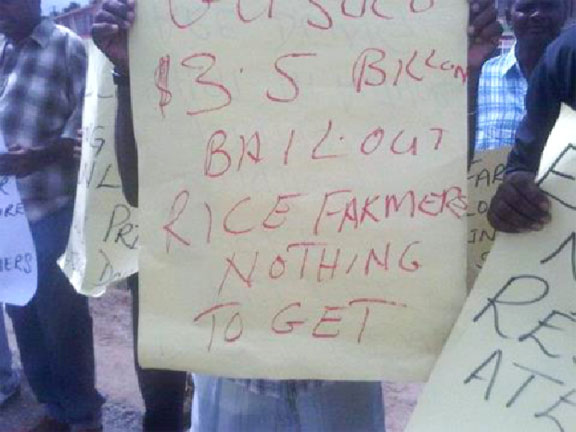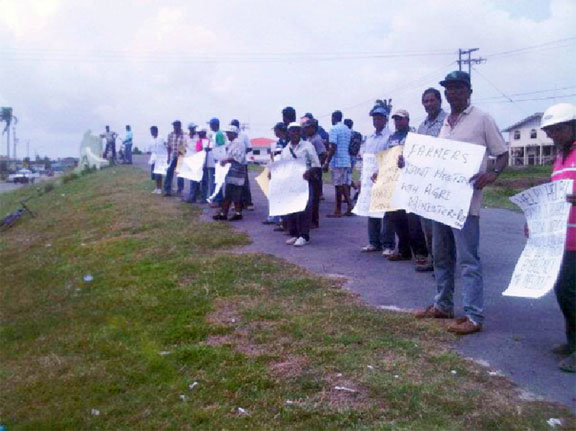By Shabna Ullah and Pushpa Balgobin
Essequibo famers yesterday announced plans to up a protest over the “low prices” being offered for rice paddy by millers in the region.
Farmers plan today to line the Reliance to Anna Regina roadway, in Region Two with mechanical farming equipment and remain until action is taken to address what they are calling “outright robbery” by rice mills.
“We have to block this road and make the mills know that we can’t continue like this,” Naichram, an Essequibo rice farmer told Stabroek News, while noting that the mills are buying paddy for “$300, $500 only sometimes they want to buy for $1000 and when rice was selling before for $4000.” He said that the millers weigh the rice at approximately 160 pounds “and that is with moisture, but then they take sometimes 20 pounds more on top of that for damages.”
In Berbice, farmers are also reporting concerns about a drop in the price being paid for paddy as well as a long waiting period before they can unload at mills, due in part to the need to dry the paddy that has moisture.
Farmers in both Essequibo and Berbice have also been told that the recent elections in neighbouring Venezuela, where the 60% of the rice harvest is sold to, have also delayed the setting of a price.
Another Essequibo rice farmer, Sham Narine, told Stabroek News that the mills were purposely selling for less and using the developments in Venezuela as an excuse. “The mills are saying that the PetroCaribe agreement is the reason they can’t pay, because of the elections in Venezuela, because of Chavez’ death,” Narine stated.
He identified the five mills in the regions that were effectively keeping the price extremely low for a bag of paddy were Caricom Rice Mill, Hack Rice Mill, Ramalakhan Rice Mill, Wazir Rice Mill and C Rice. All of the mills know that the farmers are dependent on them buying rice paddy, Narine said, so they can buy for cheap and then resell at a good price.

But President of the Rice Producers’ Association (RPA) Leekha Rambrich told Stabroek News that government was presently at the stage of arranging the shipping contract to Venezuela. He dispelled speculation that Guyana may lose the Venezuelan market because of the election and said the “contract was already signed but it has to go through a process.”
Last year 140,000 tonnes of paddy and 50,000 tonnes of rice were shipped there, he recalled. He mentioned that there is a setback with the shipping because Venezuelans “would stop working from Thursday afternoon and return to work on Tuesday morning.”
Rambrich said the price for that market was estimated between $53,000 and $58,000 per tonne for this crop as compared to $58,000 and $65,000 farmers had earned in 2012. In 2011, the rice was sold for $60,000 to $65,000 per tonne and in 2010 the price was from $55,000 to $60,000 per tonne.
At the mills, farmers were paid $3,500 to $4,200 per bag in 2010, depending on the grade of the paddy. In 2011 they earned from $3,800 to $4,500 and 2012 the price was between $4,200 and $4,800 per bag of paddy.
Substandard
Narine said that since the farmers began their protest on Wednesday, they had met with the Region Two Chairman Parmanand Persaud, but walked out of the meeting because he accused them of selling bad goods.
Naichram, meanwhile, noted that that General Manager of the Guyana Rice Development Board (GRDB) Jagnarine Singh, on his visit to the region yesterday, blamed the famers for selling a substandard product and upheld the right of the mills to pay less for paddy. “He tell us that the paddy bad, but farmers are doing what they have to do, they are spraying… but what we are saying is that the chemicals we are getting is not standard,” he explained, while noting that some farmers are spraying pesticides up to 15 times. He said that “the GRDB and the chemical board aren’t testing this chemical, they aren’t testing and then they are giving us bad product and we are still producing.”
Both Naichram and Narine accused the Regional Chairman of siding with the mills. Narine further said that farmers needed to continue harvesting, but that payment for this seasonal harvest would take up to six months.
Naichram added that many of the mills paid with post-dated cheques. “We have the two crops a year and we are not getting paid until the rice gets to Venezuela. That’s not okay and now when they are measuring the rice, they are measuring nine bags and they want to say that is then just $5,000.”
Region Two’s farmers are not strangers to low paddy prices and last year they collectively asked for the RPA to introduce qualified officers to assess the quality of the paddy to ensure that mills could not set lower prices.
Waiting
Meanwhile, with the rice harvesting period now on, trucks loaded with paddy can be seen lining the roadways in Berbice, with some drivers waiting about one week before they can finally get to discharge at the mills.
Farmers were told that the mills don’t have the capacity to “take off that amount of paddy at the same time. They have to mill a set and empty it before they are ready to take again so the trucks have to wait.”
They also said that another reason for the delay is “paddy comes with moisture from the backdam and the millers had to dry it before storing. It has to go through a process to clean the straw and that was causing a delay.”
The farmers were happy that the “weather was fairly good” and that they did not have problems with the dams like the last crop.
According to them, the moisture was a result of some of the paddy being harvested “a bit green because the rice plant too late. But when the combine ready we have to cut.”
Despite the long wait, farmers were still happy that they were getting market. They were still unsure about the price they would be paid per bag but they heard that there would be a reduction from previous years.
They were aware too that although the Venezuelan elections were over, it would still take a few weeks for the country to “settle…” and for a price to be fixed.

In the meantime, they said, one mill was paying “$3,000 per bag and whatever is the price they would give the farmers.” Reports are that other mills were paying about $500 and $1,000 more.
Some farmers on the Corentyne pointed out that they have suffered “blows” with the low yield because of the poor weather conditions in the earlier part of the crop.
At the beginning of the crop, two pumps at Black Bush Polder and one at Manarabisi, Skeldon “had given up” and farmers were unable to access water for the crop. Rambrich said that as a result, “close to 600 acres of rice were lost in Region Six.” Farmers also “ended up spending a lot more money to try to save the crop.”




